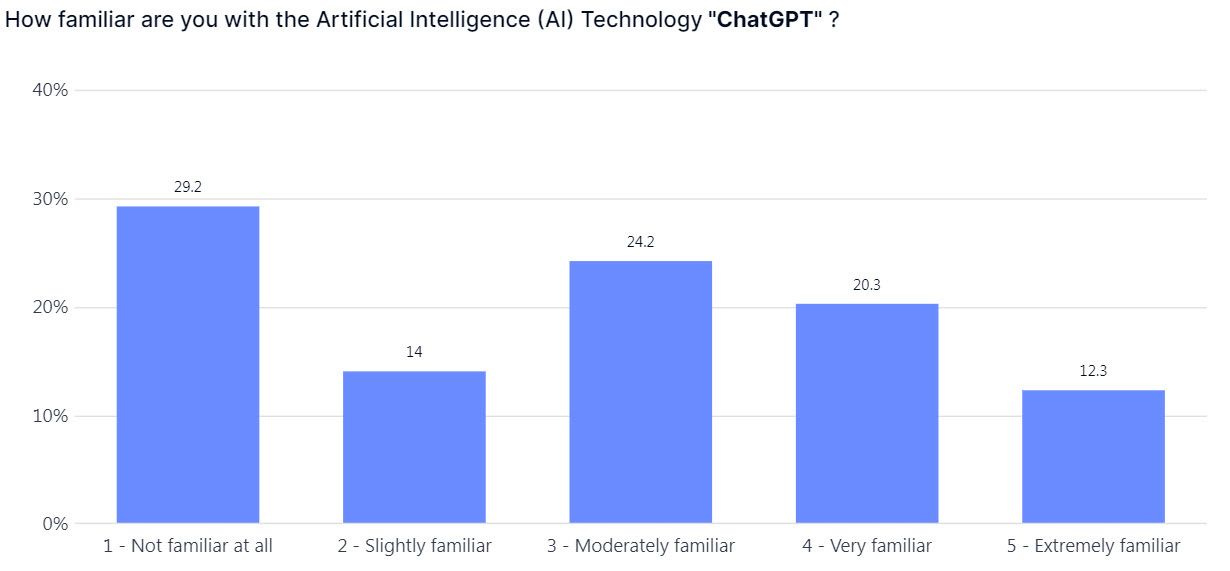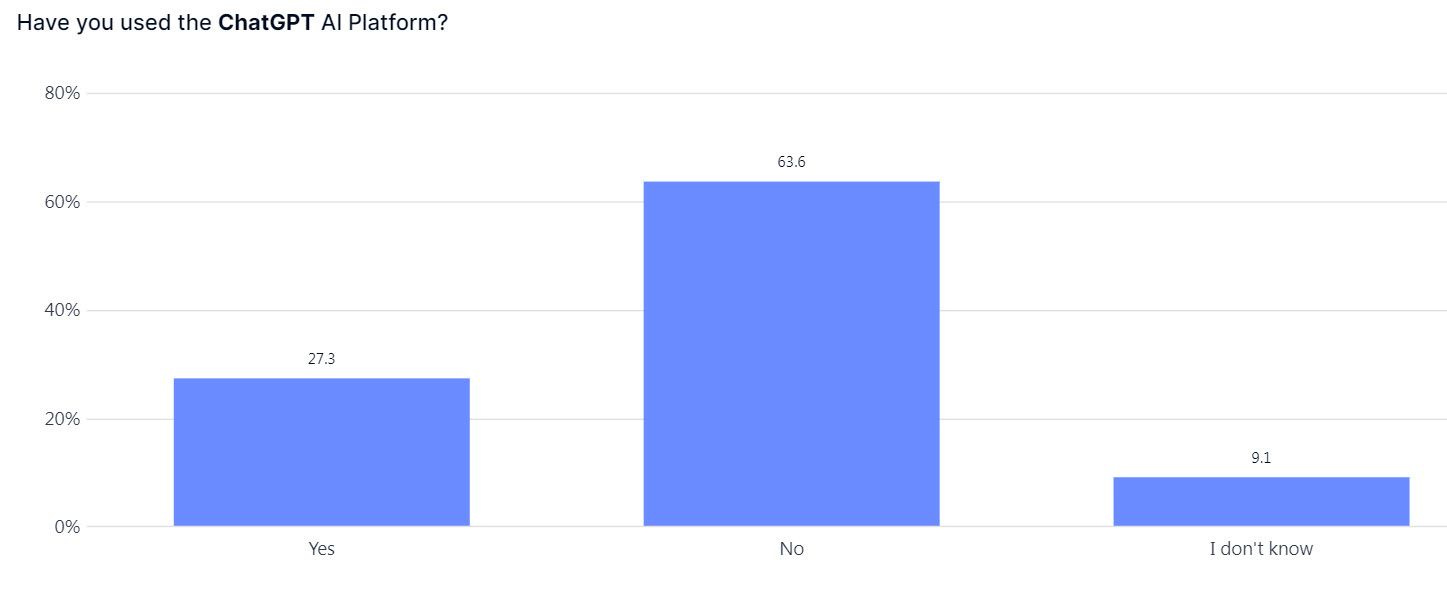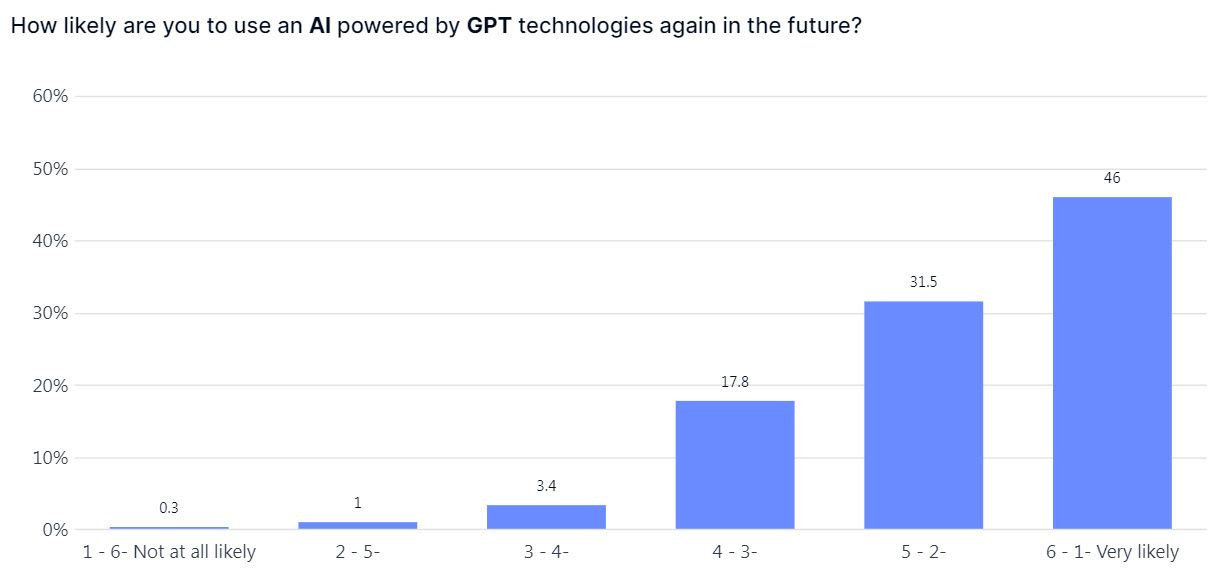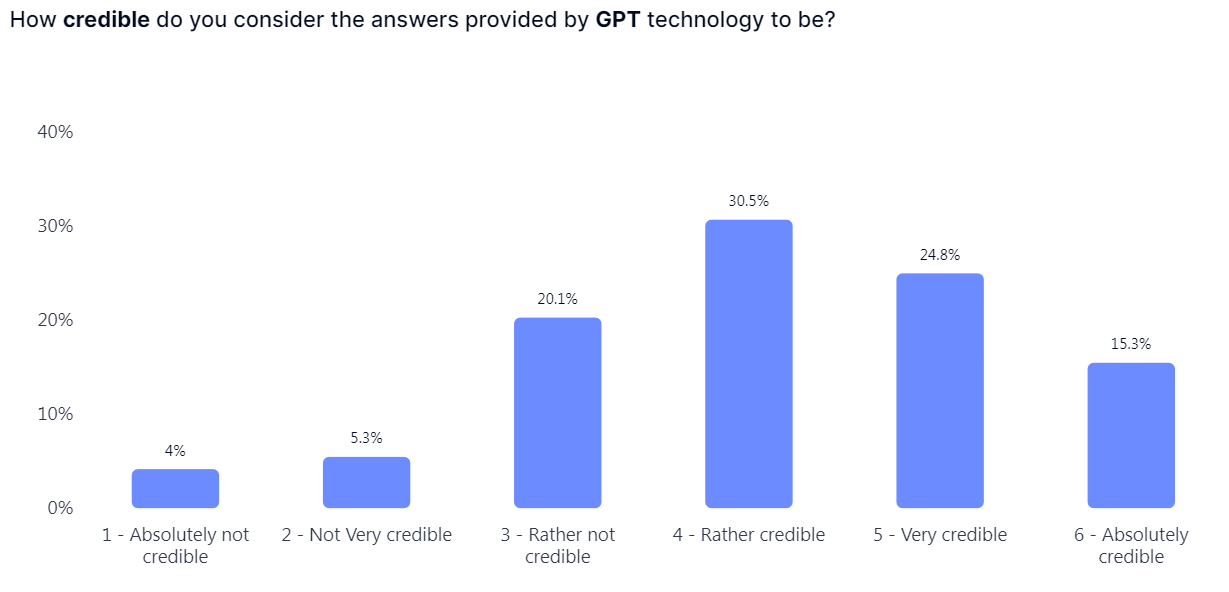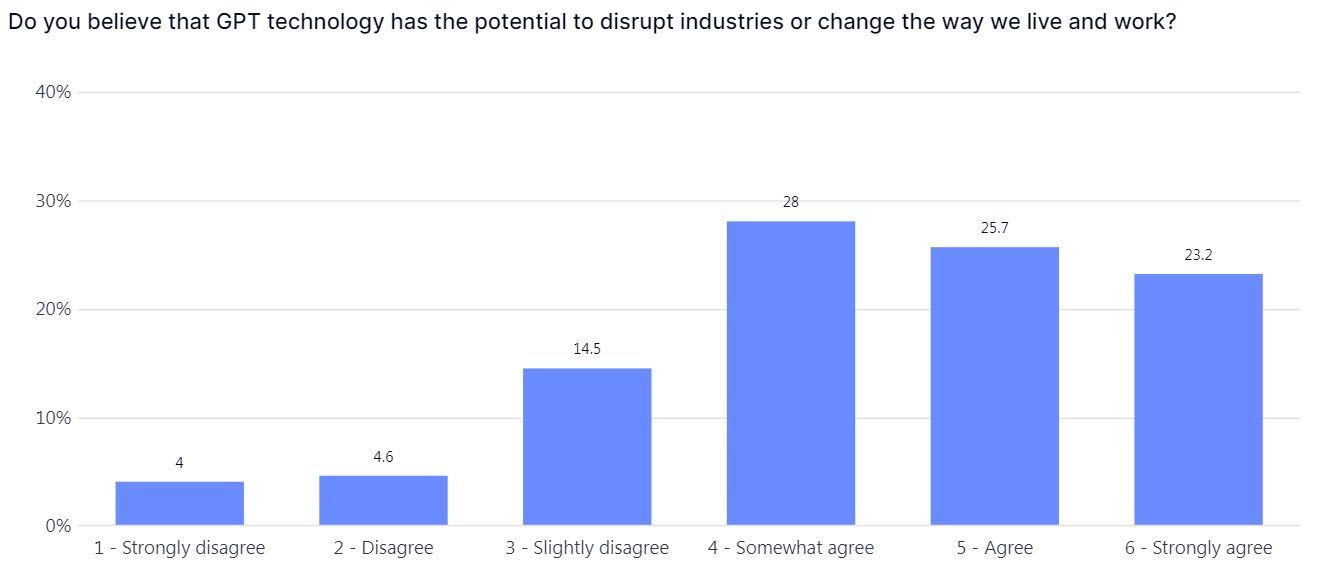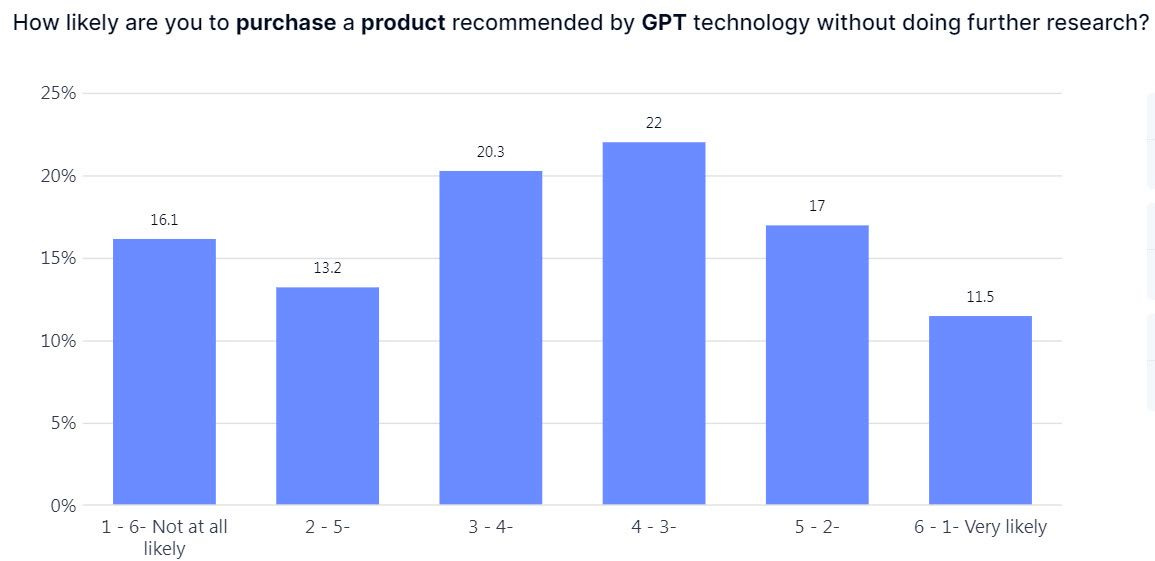New data: what consumers really think about generative AI
A survey of over 1,000 participants explores questions about adoption and trust of generative AI answers.
Over the last 3 months, we’ve experienced massive changes in the search ecosystem. First, the world was introduced to generative AI when Chat GPT launched at the end of November and set a new record for user adoption. Then, some sites revealed they had successfully used AI content for months (read my analysis of how Red Venture’s AI content performs). Lastly, the two largest search players, Google and Bing, raced to make the biggest change to their experience in decades and launch an AI chatbot integration with search.
However, throughout all these developments, one critical piece of information has been missing: the consumer view. We haven’t seen any data about user trust, adoption or usage. If consumers reject Chat GPT or generative AI results, all technological progress doesn't matter. Today, I present data that gives us a better understanding of the consumer view.
A new survey about the consumer adoption of AI
In collaboration with Appinio, who were so kind as to run the survey and provide me with the results, we set out to find answers to questions like:
How many people have even heard of Chat GPT?
Do users trust AI-generated content?
What are people using Chat GPT for?
Is the AI hype just short-lived or justified?
Would users buy products recommended by AI?
And more…
The goal is to help marketers and builders better understand how consumers view generative AI and what this could mean for Tech, Marketing and, specifically, SEO.
For the research, we surveyed 1,091 participants in the US with a 50/50 gender split between the age of 16 and 65 (average = 40.2). We asked participants 12 questions:
How familiar are you with the Artificial Intelligence (AI) Technology "ChatGPT"?
Have you used the ChatGPT AI Platform?YesNoI don't know
Have you used a chatbot powered by GPT or similar technology in the past? (ex. DALL-E)
For what purposes have you used the “ChatGPT” Platform?
How likely are you to use an AI powered by GPT technologies again in the future?
How credible do you consider the answers provided by GPT technology to be?
How much do you trust the answers provided by GPT technology?
How skeptical are you towards AI-generated content?
How likely are you to purchase a product recommended by GPT technology without doing further research?
In one word, how would you describe GPT technology?
What are your overall thoughts on GPT technology?
Do you believe that GPT technology has the potential to disrupt industries or change the way we live and work?
Here are the results:
How many people use Chat GPT?
To understand the mind share of generative AI, we wanted to know how many percent of the US population had at least heard of Chat GPT. 29% of survey participants are not familiar with Chat GPT, but 70.8% have at least heard of it, and 32.6% are very familiar with it.
If we extrapolate these results to the US population (~331M), at least 230 million people would have heard of Chat GPT. Globally, that number must be multiples higher. Even if Chat GPT was just a PR stunt for Open AI, it has already paid off multiple times.
To no surprise, the age group most familiar with Chat GPT is people between 25-34y. We see a steeper dropoff after ~45 years of age. Older generations simply take more time to adopt new tech.
Over a quarter of participants have used Chat GPT, which would extrapolate to over 80M people in the US. Of those who said "no", 80.4% said they’re extremely skeptical about ai-generated content. Since we've learned that the majority of people have at least heard of Chat GPT, we can derive that most people haven’t shied away from using Chat GPT because they don’t know it but because they’re skeptical.
One point detail to highlight: there were many reports in the media that Chat GPT had crossed the 100M user mark. However, the data is based on a Similarweb analysis that came to the conclusion ~100M users had visited the Chat GPT site, which is not equal to users. In line with the survey results, however, it's quite possible that the real number of Chat GPT users is not far away from 100M.
One important question when it comes to adoption is whether users try Chat GPT once or get hooked and stick. 100M users don't mean much if they don't stick around. However, the data indicates that the majority of users (77.5%) who tried Chat GPT use it repeatedly. The product is extremely sticky, and it's likely that similar products, like Bing's new AI-powered search or Neeva, show similar stickiness.
When participants were asked whether they had used other generative AI tech before, a third said yes. Keep in mind that the participants were randomized, meaning this is not a tech-affine panel but broad population. The rise of generative AI goes way beyond Chat GPT.
What are people using Chat GPT for?
Of the 27.3% of participants who said they had used Chat GPT before, 27.5% used it for creative writing, 19.8% for problem-solving, and 13.1% for data analysis. What sticks out in the data is the extremely broad spectrum of AI chatbot usage across creativity and analysis.
Though not explicitly mentioned, search and problem-solving can be seen as different means leading to the same outcome. It would be too far-fetched to say that AI chatbots replace search, but we can say that AI chatbots help consumers solve problems well enough for users to retain.
Do users trust generative AI results?
One central question about generative AI is how reliable and trustworthy the results are. While there is no doubt that generative AI is perfect, we often have a different perspective as technicians than the wider population.
When asked how credible generative AI answers are, 29.4% of participants said they were not credible, while 70.6% said they were at least rather credible.
When we segment those responses by whether participants have used generative AI or not, we see a strong pattern: people who used Chat GPT find the results more credible than those who haven't. This is a pattern that draws through the whole survey!
76.9% of participants said Chat GPT has the potential to disrupt industries or change the way we live and work, 23.2% strongly agreed. Across the whole panel, only 4% strongly disagreed, and 4.6% disagreed. Even though some people are skeptical about AI content, they still believe AI has the potential to change our lives.
Again, having used Chat GPT significantly increases the likelihood that people agree with the strong disruption potential of generative AI.
Would consumers buy products recommended by Chat GPT?
After understanding what people use generative AI for and how they feel about the results, the missing piece of the puzzle is whether consumers would buy products recommended by an AI chatbot.
When asking people whether they would purchase an AI-recommended product without further research, the results were mixed. 16.1% would not buy AI-recommended products without further research, while 11.5% would. The majority of participants seem to be torn.
However, when comparing the answers with people who used generative AI and those who haven't, we see a strong inclination to buy AI-recommended products among generative AI users and the opposite trend among non-users.
Conclusion: exposure drives trust, but not blindly
The data strongly suggests that people who have tried generative AI (Chat GPT or other applications) find the results more credible, are more likely to use it again and would even buy AI-recommended products. However, it does not seem consumers blindly trust AI.
If Marketers use AI to create content, they should invest in credibility and trustworthiness by adding a human component, like editors/reviewers/fact-checkers, to the content.
It's likely that AI chatbots in Search are not a short-term phenomenon. They help people solve problems, and that's what Search is all about. But there is hope for SEOs: users remain skeptical about product recommendations without further research, meaning there is a chance they still click through to websites (read my Memo about why chatbots might be good for SEO).
As always, we need more research to better understand how user adoption and perception change over time. Generative AI is not a new field in machine learning, but certainly new to consumers.
I want to leave you with two things: a link to the Appinio dashboard in case you want to look at the raw data and a small collection of opinions about generative AI from the survey to add qualitative points of view to the data. I didn't modify any of the statements and tried to select them as objectively as possible.
“I am concerned about the effect it is having in collegiate curriculum. It is now commonplace for ChatGPT to take on the brunt of a research assignment- citations and all. If we rely too heavily on it, we may lose the driving force behind education and become unable to work without it. Research skills are vital in creating a better world for us all.”
“I think GPT is going to be a great tool for companies and consumers to use to help make our lives better. It still has a little ways to go before it's perfect, but that doesn't mean we can't use/experiment with it now.”
“It is very helpful with advanced search technology. It has benefits like question answering, machine translations, generating creative functions, creating recipes, and natural language understanding. etc”
“It's exciting but also kind of scary. It could be a great tool for us as a species or it could lead to huge problems for us. Either way it feels like something big is coming.”
“I haven't made my mind up yet. but like any other new advance it can be used for great good and some people will use it and abuse it for scams and money making.”



